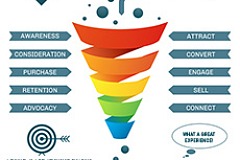Artificial intelligence (AI) has undergone significant advancements in recent years, evolving from a niche technological concept into a mainstream tool with multiple applications. This rapid evolution has not only caught the attention of the tech giants but has become increasingly relevant for businesses operating in the $2-$25 million bracket.
For these businesses, AI presents both challenges and opportunities. Here's some background on how AI works, and how you can harness it to give your business a competitive edge.
Types of AI: Custom vs General
AI comes in two primary types: custom AI and general AI. Custom AI is tailored to specific business needs and requires datasets to train on. It's designed to perform specialized tasks and can be incredibly efficient when set up correctly.
However, developing custom AI systems requires expertise, as it needs to be trained on the relevant data to function effectively. For businesses looking to develop custom AI solutions but lacking in-house capabilities, companies like OpenAI and IBM Watson offer guidance throughout the setup and development process.
General AI, on the other hand, is designed for a wide range of tasks and doesn't require specific training for each application. Platforms like Google's DeepMind or Microsoft's Azure AI are some examples of general AI solutions. Search online for options, you’ll find many more.
By now, most have heard of CHAT GPT and are perhaps aware of more specialized general AI platforms that convert descriptions to pictures and illustrations. Both can be powerful tools that are easy to use in writing email responses to creating marketing campaigns… and that’s just the surface of the power of these tools.
 As an illustration of the power of AI, the image displayed is created by a simple text description. I think you’ll agree that it is difficult to tell it is not a real person. It was created by Adobe using their AI tool called Firefly.
As an illustration of the power of AI, the image displayed is created by a simple text description. I think you’ll agree that it is difficult to tell it is not a real person. It was created by Adobe using their AI tool called Firefly.
You will find these platforms are user-friendly, and become more capable, reliable, and flexible seemingly daily. They are a good starting point for business owners new to AI because they offer tools and solutions that can be applied across various sectors without needing extensive customization.
For companies just starting the AI journey, it might be beneficial to initially explore general AI platforms to understand their capabilities and potential applications. As your understanding of the tool grows and specific needs become apparent, you can consider investing in custom AI solutions for more tailored results.
The Power of Custom AI Systems
AI technology allows small and medium-sized businesses (SMBs) to develop customized systems tailored to their specific content and needs. Instead of relying on generic solutions, companies can now create AI tools that align closely with their operational requirements and objectives.
For example, email merchants often face a myriad of user questions ranging from product details to shipping queries. Handling these manually can be resource-intensive, leading to delayed responses.
However, with a custom AI system in place, email merchants can respond to the most common questions based on historical data and provide instant, accurate answers. This streamlines customer service operations and improves the user experience by offering timely and relevant responses virtually instantly.
Unearthing Buried Knowledge with AI
SMBs often face a common challenge: they possess a wealth of technical knowledge, but much of it remains buried within stacks of documents, manuals, and files. This valuable information, if inaccessible or overlooked, can lead to missed opportunities and inefficiencies.
Custom AI offers a solution to this challenge. With its advanced data processing capabilities, AI can sift through vast repositories of electronic documents in a fraction of the time it would take a human. It can identify patterns, extract key pieces of information, and even categorize data for easier access in the future.
There are multiple benefits to be had from deploying AI in this way.
First, by drawing on historical data and previous solutions it can proactively address questions that haven't been explicitly asked. For instance, if a customer inquiry relates to a recurring issue, AI can quickly retrieve relevant solutions, saving time and effort.
Additionally, by making previously "buried" knowledge readily available, businesses can drive innovation, improve decision-making, and enhance overall operational efficiency.
The Many Ways to Use AI
Business owners can use artificial intelligence in multiple ways to improve efficiency and precision. Some examples include:
- Legal Affairs. AI has made significant strides in streamlining legal affairs. Its capabilities range from automating contract reviews, which is traditionally a time-consuming task, to ensuring consistent terminology and flagging potential issues. Also, AI can predict possible legal outcomes based on historical case data, giving businesses a strategic advantage in legal proceedings. AI systems also make it easier to ensure compliance, especially in industries with strict regulations, through monitoring and alerts.
- Product Research. AI takes on a pivotal role in product development and research. It can analyze customer feedback and identify patterns and sentiments that manual reviews might miss. These insights allow businesses to grasp their target market needs, forecast upcoming trends, and make informed decisions about product features and enhancements.
- Sales and Marketing. Sales and marketing functions reap numerous benefits from AI integration. AI tools use past behaviors and preferences to personalize customer interactions, creating more meaningful engagements. AI-powered predictive analytics forecast sales trends, letting businesses strategize effectively. Moreover, AI automates routine tasks like data entry and follow-ups, freeing up sales teams to concentrate on core activities.
- Digital Communications. AI significantly enhances the digital communications of a business, such as the website. AI-driven design elements elevate user experience by adapting to individual visitor preferences. AI-powered chatbots offer round-the-clock customer support, respond to queries, and guide users. As well, AI algorithms also curate personalized content recommendations for visitors, boosting engagement and potential conversions.
In each of these areas, AI streamlines operations and achieves a previously unattainable level of precision and personalization.
Tools and Platforms for Different AI Applications
Many AI tools exist already, and it seems like there are multiple tools for every business requirement. Choosing the right tool can be the difference between successful AI integration and a missed opportunity.
Here's a comparative analysis of some of the leading AI tools designed for different business applications, with recommendations based on their efficiency, cost, and ease of use.
For Legal Applications
- Lex Machina: Offers legal analytics to predict litigation outcomes based on historical data.
- Kira Systems: Automates the extraction of data from contracts and other documents.
Recommendation: Kira stands out for businesses seeking comprehensive contract analysis due to its ease of use. However, Lex Machina offers a more specialized solution for predictive legal analytics.
For Product Research
- Brandwatch: Analyzes customer feedback across various platforms to gauge sentiments.
- Spacy: An open-source tool for natural language processing, helpful in extracting insights from textual feedback.
Recommendation: Brandwatch offers a more user-friendly interface and comprehensive analysis, suitable for businesses without a dedicated tech team. Spacy, while powerful, might require more technical expertise.
For Sales and Marketing
- Inside Sales: Uses AI to predict sales trends and optimize sales strategies.
- Conversica: An AI-driven sales assistant that automates routine tasks like lead follow-ups.
Recommendation: For businesses looking to automate sales tasks, Conversica is a go-to. However, for predictive sales analytics, InsideSales.com provides more in-depth insights.
For Digital Communications
- Chatfuel: Enables businesses to create AI-powered chatbots for their websites without coding.
- Dynamic Yield: Offers AI-driven personalized content recommendations for website visitors.
Recommendation: Chatfuel is ideal for businesses seeking a straightforward chatbot solution. For content personalization, Dynamic Yield offers robust features that enhance user engagement.
The choice of an AI tool or platform largely depends on a business's specific needs. While cost matters, the tool's efficiency and ease of use should take precedence in the decision-making process. Business owners can realize significant long-term benefits by investing time in understanding and choosing the right AI solution.
The Double-Edged Sword: AI's Potential Pitfalls
While companies can undeniably benefit from AI, they must also acknowledge that, like any tool, AI presents challenges. Although its autonomous nature is a strength, it can sometimes produce unexpected – and undesired – results.
For example, in 2016 Microsoft launched Tay, an AI chatbot, on Twitter. Tay, designed to learn from interactions, began producing inappropriate and offensive tweets quickly after certain internet users influenced it. This incident underscored the risks of unsupervised machine learning. The issue has largely been resolved, but it shows what can happen if users aren't watchful.
The maxim “Trust but Verify,” is simply smart business, so make it a point to review what is being sent, even if that is just a periodic sampling of output.
AI functions using the data on which it trains. If trainers provide biased, incomplete, or outdated data, AI might deliver off-mark or misleading results. For example, if biased hiring data trains an AI system, it might continue those biases in its recruitment suggestions, resulting in non-diverse hiring.
Tips, Tricks, and Best Practices
Successfully integrating AI into your business operations goes beyond merely adopting the technology. It requires a strategic approach, informed by best practices, to maximize benefits and minimize pitfalls.
Setting Up AI Requests Effectively
Crafting precise AI queries is crucial for obtaining accurate results. Two platforms and sites offering guidance in this area are:
- OpenAI Playground: Provides a sandbox environment where businesses can test and refine their AI queries.
- Google's AI Hub: Offers resources and tools to help businesses craft effective AI requests tailored to their specific needs.
Quality Control
Before deploying AI-generated content or solutions, verify their accuracy and relevance. Regularly ask team members to review AI outputs to align them with business goals and standards. Implement automated testing tools that swiftly pinpoint anomalies or errors in AI-generated content. Also, set up options for users or stakeholders to give feedback on AI outputs to promote continuous improvement.
Continuous Learning
AI inherently learns and adapts. However, it's vital to have human oversight direct this learning. Periodically retrain your AI models using fresh data to keep them current and relevant. Analyze feedback from users and stakeholders, pinpointing areas for AI system improvement and making necessary changes. As the AI landscape evolves, make it a point to attend workshops, webinars, or courses to stay updated on the latest developments.
Exciting Opportunities for SMBs
Artificial intelligence offers many exciting opportunities for SMBs, from driving growth and innovation by streamlining operations to enhancing customer experiences. However, using it requires a responsible approach:
- Train AI on unbiased data,
- Regularly refine its outputs, and
- Balance automation with human oversight.
By following these best practices, businesses can harness the power of AI while mitigating potential risks. Embrace AI judiciously to leverage its advantages, avoid common pitfalls, and build a successful business of the future.














